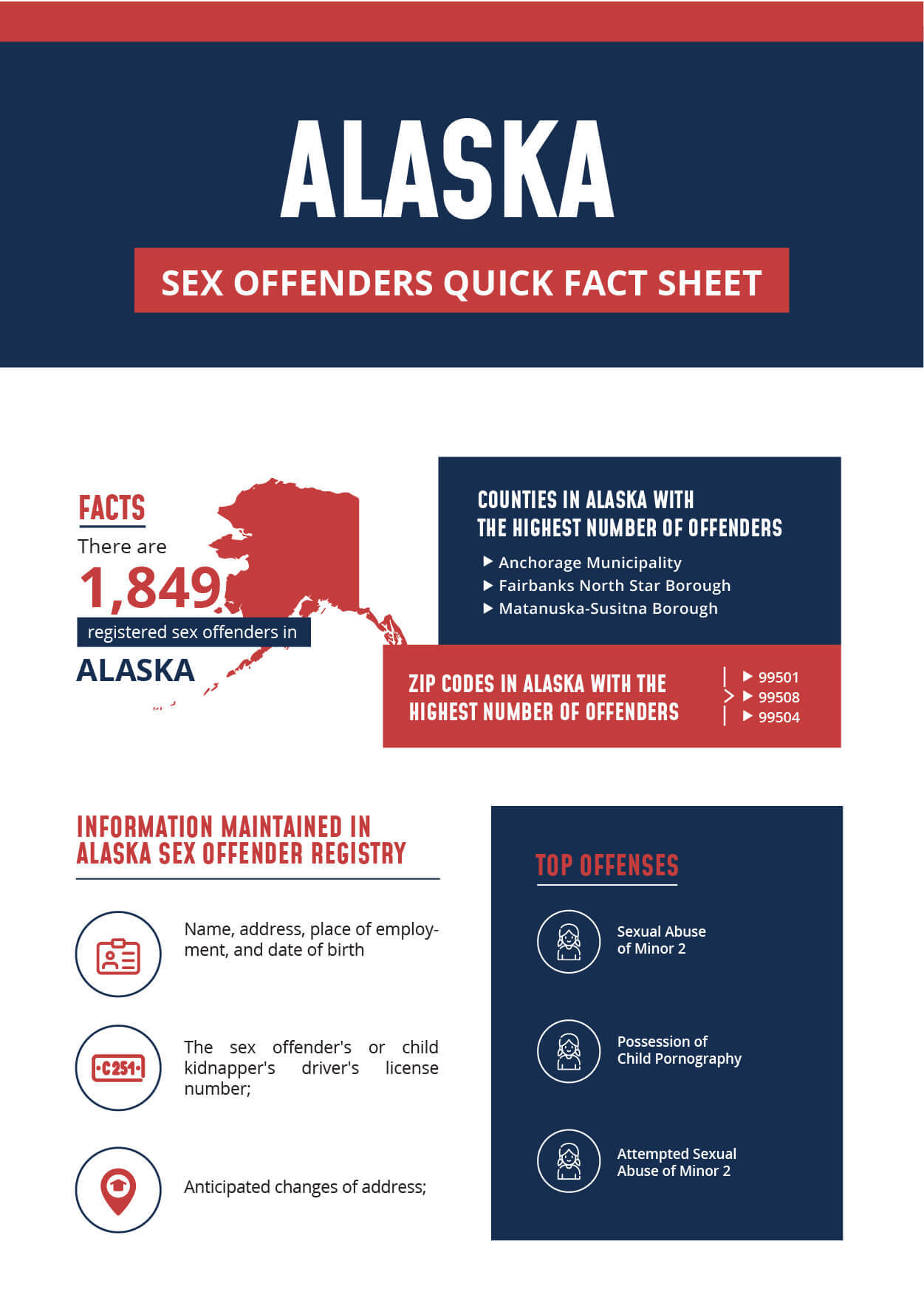The Alaska Sex Offenders Law came after the sexual assault and murder of Megan Kanka in New Jersey. Megan’s death in the hands of a re-offending sex offender got the attention of legislators in Alaska.
Alaska Sex Offenders law protects the State from such tragedy. The law also prevents sex offenders from re-offending after their first release from custody.
The law states that sex offenders must report regularly to a law enforcement agency in the state. Offenders should provide valid information on their home address.
The law restricts registered sex offenders from specific areas in the state. Areas like bars, parks, and public places are out-of-bounds for sex offenders. Sex offenders are also made to live within a defined distance from public spaces like schools and parks.
The law makes sure every offender in the state registers his information with the Registry. This information will assist in protecting public safety.
Identify Nearby Sex Offenders in Alaska ⮕
Alaska Sex Offender Registry
Alaska Sex Offenders Registry, protects the public by providing detailed data on sex offenders. Information on sex offenders in Alaska is available on the internet.
The Registry collects fingerprint and photographs of sex offenders. Special cases require the DNA information of the offenders for the record. Other information on record is the email addresses and place of employment of offenders.
You can search for sex offenders near your community by using the name of your city. You can narrow down your search by using your neighborhood in the registry’s database.
Information like the address and mug shot of previous sex offenders will help prevent the re-occurrence of a sex offense in Alaska.
How Well do You Know the People in Your Child's Life?
Get a Background Report in minutes.
Alaska Sex Offender Infographic

Learn and share vital facts and figures about Alaska sex offenders with this convenient infographic.
View Alaksa Sexual Predator Infographic
Alaska Sex Offender Facts
Facts
- There are 2,330 registered sex offenders in Alaska as of 12/14/2021.
Top Offenses
- Sexual Abuse of Minor 2
- Possession of Child Pornography
- Attempted Sexual Abuse of Minor 2
- Sexual Assault 2
- Sexual Abuse Of Minor 3
Counties in Alaska with the highest number of offenders:
- Anchorage Municipality
- Fairbanks North Star Borough
- Matanuska-Susitna Borough
- Kenai Peninsula Borough
- Juneau City And Borough
Zip Codes in Alaska with the highest number of offenders:
Nearby States:
Alaska Sex Crimes Requiring Offender Registration
Offenses for Which Registration are Required Under ALASKA STAT. § 12.63.01:
- 1st-degree murder during the commission or attempted commission of a sexual offense or kidnapping of a child under the age of 16 - ALASKA STAT.§ 11.41.100(a)(3) .
- 2nd-degree murder during the commission of sexual assault in 1st or 2nd degree or the sexual abuse of a minor in the 1st or 2nd degree - ALASKA STAT. § 11.41.110(a)(3).
- Sexual assault (1st degree) - ALASKA STAT. § 11.41.410.
- Sexual assault (2nd degree) - ALASKA STAT. § 11.41.420.
- Sexual assault (3rd degree) - ALASKA STAT. § 11.41.425.
- Sexual assault (4th degree) - ALASKA STAT. § 11.41.427.
- Sexual abuse of a minor (1st degree) - ALASKA STAT. § 11.41.434.
- Sexual abuse of a minor (2nd degree) - ALASKA STAT. § 11.41.436.
- Sexual abuse of a minor (3rd degree) - ALASKA STAT. § 11.41.438.
- Sexual abuse of a minor (4th degree) - ALASKA STAT. § 11.41.440.
- NOTE: 4th-degree sexual abuse of a minor (offender is over 18 and at least 3 years older than a victim who is 16 or 17) - ALASKA STAT. § 11.41.400(a)(2).
- Incest - ALASKA STAT. § 11.41.450.
- Online enticement of a minor - ALASKA STAT. § 11.41.452.
- Unlawful exploitation of a minor - ALASKA STAT. § 11.41.455.
- Indecent exposure (1st degree) - ALASKA STAT. § 11.41.458.
- Incest - ALASKA STAT. § 11.41.450.
- Indecent exposure (2nd degree), if the victim is under 16 and offender, has a previous conviction for that offense -ALASKA STAT. § 11.41.460.
- Distribution of child pornography - ALASKA STAT. § 11.61.125.
- Possession of child pornography - ALASKA STAT. § 11.61.127.
- Promoting Prostitution (1st degree) if the person who was induced to engage in prostitution was 16 or 17- ALASKA STAT. § 11.66.110.
- Promoting Prostitution (2nd degree) if the person who was induced to engage in prostitution was 16 or 17-ALASKA STAT. § 11.66.130(a)(2).
Information maintained in Alaska Sex Offender Registry
- Name, address, place of employment, and date of birth
- each conviction for a sex offense or child kidnapping for which the duty to register has not terminated under AS 12.63.020, the date of the sex offense or child kidnapping convictions, the place and court of the sex offense or child kidnapping convictions, and whether the sex offender or child kidnapper has been unconditionally discharged from the conviction for a sex offense or child kidnapping and the date of the unconditional discharge; if the sex offender or child kidnapper asserts that the offender or kidnapper has-been unconditionally discharged, the offender or kidnapper shall supply proof of that discharge acceptable to the department;
- All aliases used;
- The sex offender's or child kidnapper's driver's license number;
- the description, license numbers, and vehicle identification numbers of motor vehicles the sex offender or child kidnapper has access to, regardless of whether that access is regular or not;
- Anticipated changes of address;
- a statement concerning whether the offender or kidnapper has had treatment for a mental abnormality or personality disorder since the date of conviction for an offense requiring registration under this chapter; and(I) each electronic mail address, instant messaging address, and other Internet communication identifier used by the sex offender or child kidnapper;
Limitations on Residency or Employment
None
Duration of Registration
A.S. § 12.63.020
(a)(1): Life for offenders convicted of:
- An aggravated sex offense
- Two or more sex offenses (including two or more convictions for indecent exposure before a person under the age of 16)
- Two or more child kidnappings, or
- One sex offense and one child kidnapping
(a)(2): 15 years for offenders convicted for a non-aggravated sex offense or a single child sex offense.
(a)(2)(c): Indefinitely for a sex offender who has not supplied proof of the offender's unconditional discharge for the sex offense requiring registration.
Timeframe for Registration
The sex offender or child kidnapper shall register: within the 30-day period before release from an in-state correctional facility; by the next working day following conviction for a sex offense or child kidnapping if the sex offender is not incarcerated at the time of conviction; or by the next working day of becoming physically present in the state.
Applies to Offenders Convicted in another State?
Yes
Verification of Address
15 years for the first offense; life if convicted of 2 or more offenses
Penalties for Non-Compliance
Class A misdemeanor or Class C felony if prior conviction for failing to register
Free Parental eBook
Kids Live Safe put together a comprehensive parents guide about sexual predators and keeping children safe.
This free online eBook includes vital statistics, how to tell if a predator is victimizing a child, and social media and cyber-bullying.
See Kids Live Safe eBook 
View Registered Sex Offenders in Your Alaska ZIP Code Below
- 99501
- 99508
- 99504
- 99801
- 99503
- 99654
- 99507
- 99701
- 99709
- 99901
- 99623
- 99517
- 99705
- 99518
- 99502
- 99611
- 99645
- 99669
- 99515
- 99577
- 99712
- 99516
- 99835
- 99615
- 99567
- 99672
- 99688
- 99610
- 99603
- 99664
- 99824
- 99556
- 99573
- 99686
- 99827
- 99737
- 99639
- 99760
- 99588
- 99676
- 99505
- 99605
- 99702
- 99530
- 99572
- 99586
- 99731
- 99568
- 99599
- 99790
- 99780
- 99704
- 99811
- 99513
- 99775
- 99703
- 99540
- 99529
- 99743
- 99506
- 99631
- 99714
